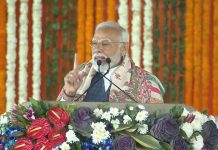
Former Pakistan PM Imran Khan’s arrest, and his subsequent release following the order of the Supreme Court is likely to intensify power struggle among judiciary, executive and the army in the neighbouring country. A report by Gopal Misra
With the release of former PM Imran Khan from custody following the Supreme Court order, how the multiple crises – political and economical, along with those emerging from clash among key institutions such as executive, judiciary and the armed forces – besetting Pakistan will play out will be keenly watched by the observers.
The Supreme Court of Pakistan has declared Khan’s arrest from the premises of the Islamabad High Court (IHC) on May 9 was “unlawful” and said that it “would be reversed”, while ordering his immediate release.
The order was passed by a three-member bench comprising the Chief Justice Umar Ata Bandial, Muhammed Ala Mazhar and Athar Minallah. Bandial urged Khan to ask his supporters to stop violence immediately and also told him to appear before the IHC and abide by its orders. Khan was arrested by the Punjab Rangers, a para-military force, from the court premises on the basis of a warrant issued by the National Accountability Bureau (NAB) allegedly for obtaining huge prime land for his personal trust, Al-Quadir.
It is stated that the release of Khan exposes the limitations of the establishment that is the Pakistan Army. The Punjab Rangers were reportedly sent by the GHQ on the request of the Prime Minister Shahbaz Sharif.
Apart from the ongoing violence, another challenge is being faced by Shahbaz, who might face the wrath of the Supreme Court for not implementing its order of conducting the polls of provincial assemblies of Punjab and Khyber Pakhtunkhwa (KPK) by May 14. The apex court may order his arrest for committing the contempt of court.
Asim’s weak hold on the army
It is yet to be ascertained whether the present army chief, General Asim Munir enjoys full control on the armed forces, or the supporters of the former army chief, Qamar Jawed Bajwa and his crony, Lt. Gen. Faize Hamid, though superannuated, continued to have influence among the commanders and young officers.
In 2018, Bajwa and Faize had not only conspired in manipulating polls to get elected Imran Khan, the president of the Pakistan Tehreek-i-Insaf (PTI) as PM, they had also ensured that the then PM, Nawaz Sharif, would not pose any challenge by implicating him in cooked-up corruption charges and influencing a docile Supreme Court.
The three-bench order clearly gives the message that the apex court is no more under the spell of the army and its secret service, Inter State Intelligence (ISI), and the present army chief does not have the necessary influence on the judiciary, which his predecessor used to have.
Meanwhile, Imran has successfully confronted the establishment and the Shahbaz Government. The spectre of violence witnessed during the first 72 hours of Imran’s arrest which engulfed the entire Pakistan shows cricketer-turned-politician’s hold on the new generation. The burning down of a part of the residence of the governor in Punjab, storming the well fortified army headquarters or GHQ in Rawalpindi or even ransacking the residence of the Corpse Commander of Lahore indicate the mood of the agitators.
In many cities, the army was summoned, but the refusal of young army officers to open fire against the pro-Imran agitators forced the army chief to withdraw them from the operations. Earlier, reports emerged about a number of agitators, including women demonstrators, getting killed in some incidents of firings.
Exodus of the rich
There are reports that the rich and powerful, including retired army generals, top bureaucrats and some businessmen, have started leaving Pakistan in chartered planes with their precious jewellery, gold and dollars. As many as 150 such flights have already taken off from Karachi, Sukkur, Islamabad, Lahore, Multan, Sialkot, Faisalabad and Quetta for destinations like Dubai, London and even New York.
The Supreme Court’s order to release Khan from custody is said to have caused a huge political setback to PM Shahbaz. It is being speculated that he may impose an emergency in the country or ask the army to impose martial law.












